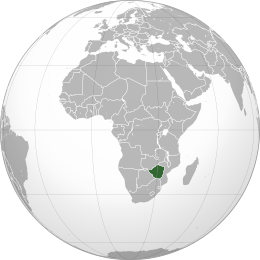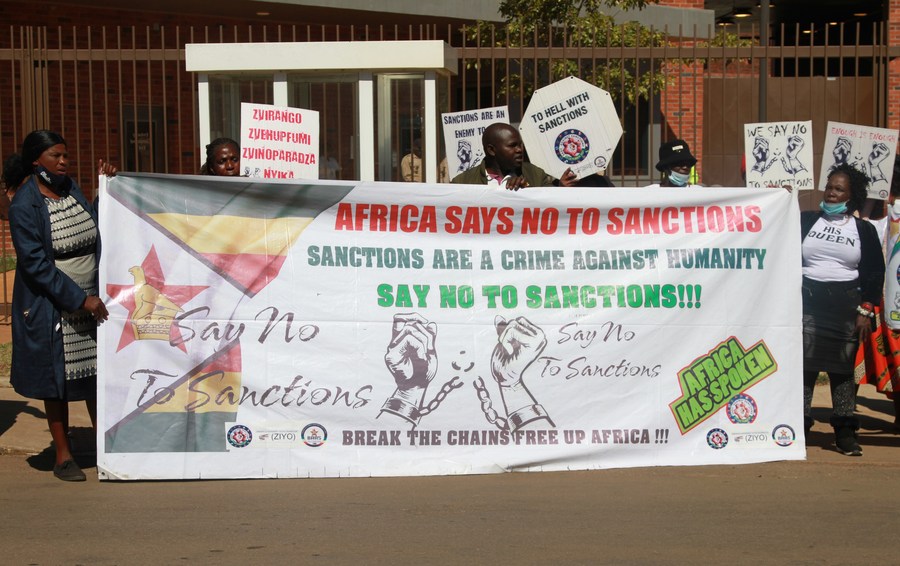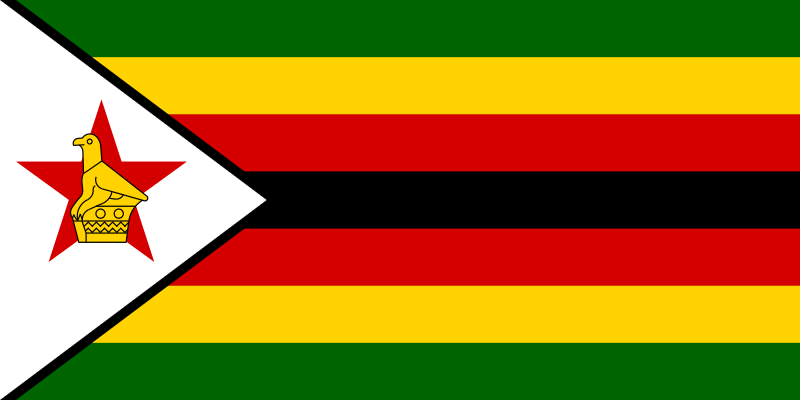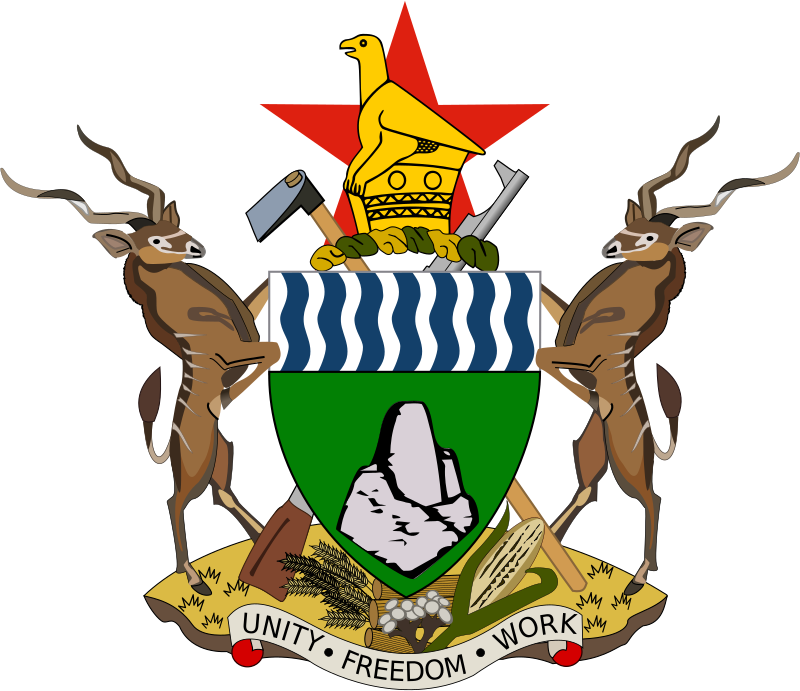More languages
More actions
| Republic of Zimbabwe Nyika yeZimbabwe Ilizwe leZimbabwe Dziko la Zimbabwe Nyika ye Zimbabwe Hango yeZimbabwe Zimbabwe Nù Inyika yeZimbabwe Nyika yeZimbabwe Tiko ra Zimbabwe Naha ya Zimbabwe Cisi ca Zimbabwe Shango ḽa Zimbabwe Ilizwe lase-Zimbabwe | |
|---|---|
Motto: Unity, Freedom, Work | |
 | |
| Capital and largest city | Harare |
| Official languages | Chewa, Chibarwe, English (used in education, government, and commerce), Kalanga, Khoisan, Nambya, Ndau, Ndebele, Shangani, Shona, Zimbabwean sign language, Sotho, Tonga, Tswana, Venda, and Xhosa |
| Demonym(s) | Zimbabwean |
| Dominant mode of production | Capitalism |
| Government | Unitary presidential republic |
• President | Emmerson Mnangagwa |
• Vice-President | Constantino Chiwenga |
| History | |
| 11 November 1965 | |
| 2 March 1970 | |
| 1 June 1979 | |
| 18 April 1980 | |
| 15 May 2013 | |
| Area | |
• Total | 390,757 km² (60th) |
| Population | |
• 2022 estimate | 15,178,979[1] |
| Currency | Zimbabwean dollar United States dollar |
Zimbabwe, officially the Republic of Zimbabwe, is a landlocked country located in Southeast Africa. It is bordered by South Africa to the south, Botswana to the south-west, Zambia to the north, and Mozambique to the east. The capital and largest city is Harare. Zimbabwe has been subjected to intense sanctions from imperialist powers, mainly in response to land reform policies that expropriated land from white settlers.[2]
The area that is now modern Zimbabwe was known during the British colonial period as Southern Rhodesia, named for imperialist businessman Cecil Rhodes, who made his fortune in consolidating diamond mines. In 1965, the colony renamed itself Rhodesia and broke from the United Kingdom with the express purpose of maintaining white rule.[3]
An article in Liberation News describes the western imperialist hostility toward Zimbabwe, saying: "hostility stems first and foremost from the fact that Zimbabwe's government has its origin in the armed struggle that ended the Western-backed racist, fascist settler regime. U.S. and British opposition to the government reached a crescendo as the Mugabe government moved to confiscate and redistribute the commercial agricultural land owned by white farmers. This land constituted 70 percent of the country’s prime farmlands."[2]
History
Precolonial era
The city of Great Zimbabwe existed from 1100 to 1500 CE and had a population of 20,000. It controlled over 100,000 km² of territory between the Zambezi and Limpopo rivers, and its economy relied on cattle, farming, and trade of ivory, copper, gold, and slaves.[4]
Sanctions

See also: Economic sanctions#Zimbabwe
According to Chidiebere C. Ogbonna in the African Research Review, from 1966 until the present, "Zimbabwe at one time or another has been under sanctions either by the United Nations the United States, the European Union or all the aforementioned. In total, Zimbabwe has been sanctioned in seven sanction-episodes: 1966, 2001, 2002, 2003, 2005, 2008 and 2009, making it one of the most sanctioned countries in the world." Ogbonna states that in a simple analysis, Zimbabwe has become a regular candidate of the "sanctions industry."[5]
According to a 2022 article by Xinhua News, the U.S. sanctions against Zimbabwe have accumulated since 2001, following a government decision to repossess land from minority white farmers for redistribution to landless indigenous Zimbabweans. The Xinhua article notes that though the Zimbabwean government said the land reform would promote democracy and the economy, "Western countries launched repeated sanctions with little regard for the average person's suffering." Linda Masarira, president of the Labour Economists and Afrikan Democrats (LEAD) political party, said sanctions have been used as a tool of economic warfare against Zimbabwe, and that sanctioning Zimbabwe "was an action that the United States of America decided to do on Zimbabwe to ensure that they make our economy scream, they make things hard for Zimbabweans and imply that black Zimbabweans, native Zimbabweans cannot do their own farming, or run their own economy."[6]
Economy
Zimbabwe has the largest lithium supply in Africa. In December 2022, the government banned raw lithium exports in order to process it into batteries in Zimbabwe.[7]
References
- ↑ https://zimbabwe.opendataforafrica.org/anjlptc/2022-population-housing-census-preliminary
- ↑ 2.0 2.1 Covington, Arthur. “Zimbabwe’s People Reject Imperialist Intervention.” Liberation News. June 2005. Archived 2022-11-15.
- ↑ The New York Times. “Rhodesia’s Dead — but White Supremacists Have given It New Life Online (Published 2018)” Archived 2022-11-10.
- ↑ Neil Faulkner (2013). A Marxist History of the World: From Neanderthals to Neoliberals: 'The First Class Societies' (p. 19). [PDF] Pluto Press. ISBN 9781849648639 [LG]
- ↑ Chidiebere C Ogbonna "Targeted or Restrictive: Impact of U.S. and EU Sanctions on Education and Healthcare of Zimbabweans." September 2017, African Research Review 11(3):31 DOI:10.4314/afrrev.v11i3.4
- ↑ Tichaona Chifamba, Zhang Yuliang, Cao Kai. "Two-decade-old U.S. sanctions leave Zimbabweans suffering, triggering protests". Xinhua. 2022-07-11. Archived 2022-09-09.
- ↑ Christopher Ojilere (2022-12-29). "Zimbabwe Bans All Lithium Exports" Voice of Nigeria. Archived from the original on 2022-12-30. Retrieved 2023-01-02.


